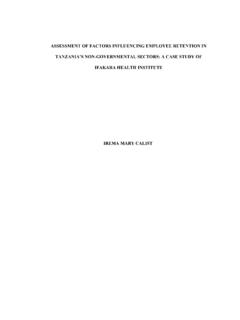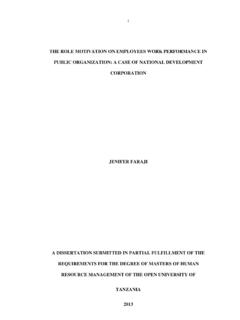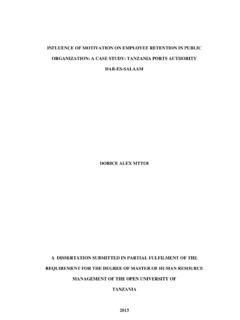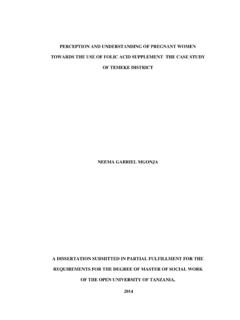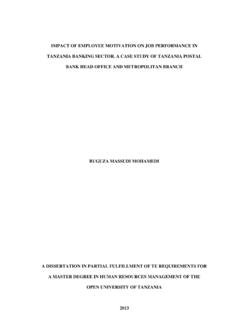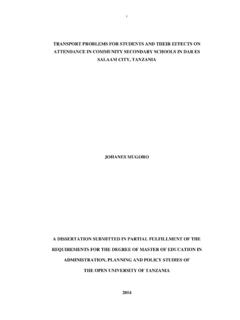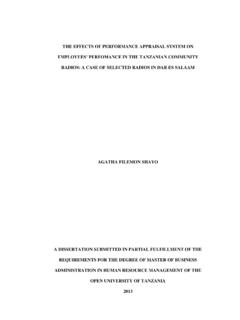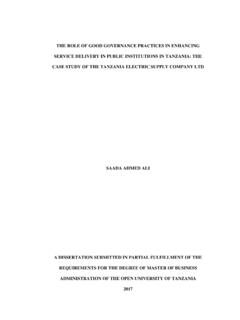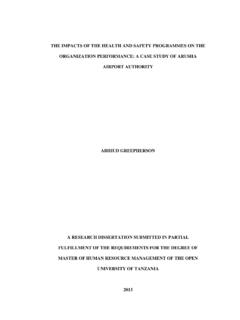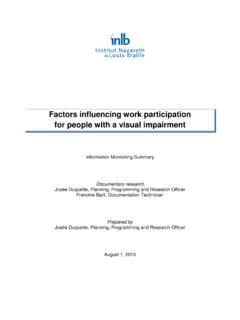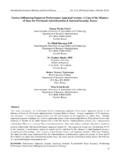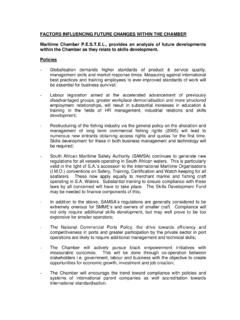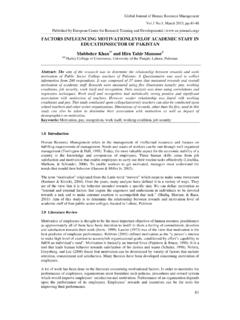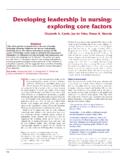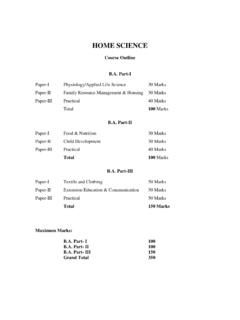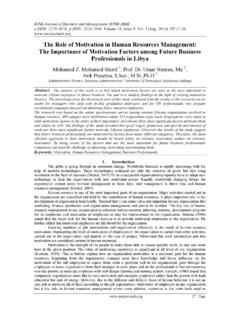Transcription of FACTORS INFLUENCING THE CHOICE OF SCIENCE SUBJECTS …
1 FACTORS INFLUENCING THE CHOICE OF SCIENCE SUBJECTS IN. secondary SCHOOLS IN TANZANIA: THE CASE OF KIBAHA. DISTRICT. MWENGA HURUMA. A DISSERTATION SUBMITTED IN PARTIAL FULFILLMENT OF THE. REQUIREMENTS FOR THE DEGREE MASTER OF EDUCATION IN. ADMINISTRATION, PLANNING AND POLICY STUDIES OF THE OPEN. UNIVERSITY OF TANZANIA. 2015. ii CERTIFICATION. The undersigned certifies that she has read and hereby recommends for acceptance by the Open University of Tanzania a dissertation titled: FACTORS INFLUENCING the CHOICE of SCIENCE SUBJECTS in secondary Schools in Tanzania: The Case of Kibaha District ,in partial fulfillment of the requirements for the degree of Master of Education in Administration, Planning and Policy Studies of the Open University of Tanzania.. , E. B. (Supervisor).. Date iii COPYRIGHT. No part of this dissertation may be reproduced, stored in any retrieval system, or transmitted in any form by any means, electronic, mechanical, photocopying, recording or otherwise without prior written permission of the author or the Open University of Tanzania in that behalf.
2 Iv DECLARATION. I, Mwenga Huruma,do herebydeclare that this dissertation is my own original work and that it has not been presented by any person and it will not be presented to any other University for a similar or any other degree award.. Signature . Date v DEDICATION. This dissertation is dedicated to; Magreth Msoka, my wife, Gladness Mwenga, my daughter, Gift Mwenga, my son andMr and Mrs Mwenga, my parents, who supported and encouraged me throughout the entire period of this course and made it possible for me to successfully complete my dissertation. vi ACKNOWLEDGMENTS. Immeasurable thanks should go to the Almighty God who gave me strength and led my ways and finally enabled me to complete my MED APPs programme, may His Name be glorified. My Sincere gratitude goes to different people, who in one way or another helped me to complete this dissertation. I would like to extend special thanks to my supervisor, Dr. Temu, for his supportive and constructive guidance throughout the period I.
3 Was engaged in this study from proposal writing to completion of this report. His advice, comments and encouragement gave me the motivation and determination to complete this dissertation successfully. I thank my family members, who supported me from the beginning to the end of the academic programme through their patience and prayers. These are my wife, Magreth Msoka, daughter, Gladness Mwenga and son, Gift Mwenga. They always prayed for me when I was undertaking my studies. Other thanks are extended to Mr. Ndunguru for his advice on data analysis. I also owe Special thanks to my father and mother, Mr. and Mrs. Mwenga, who gave me full support and encouragement and facilitated me with some academic requirements. To all these people I pray to His Almighty God to shed His grace and blessings on them. vii ABSTRACT. The main objective of this study is to identify FACTORS , whichinfluence the CHOICE of SCIENCE SUBJECTS in secondary schools in Tanzania.
4 The study was conducted in Kibaha district as a case study. A total of 122 respondents from six different co- educational secondary schools represented by letters A, B, C, D, E, G and F were involved in the study. The study adopted a holistic case study design. Both Qualitative and quantitative approaches were used and data were gathered through Questionnaires, Interviews, Observations, Documentary Reviews and all ethical issues such as seeking permission for data collection from responsible authorities andconfidentiality of respondents were observed. Descriptive statistics for data analysis were backed by Microsoft office Excel. The study found out that some FACTORS were found to have great influence in deciding to study SCIENCE SUBJECTS and have sustaining power to students regarding their CHOICE and sustainance of SCIENCE SUBJECTS . Also FACTORS that led to low or high students performance in SCIENCE SUBJECTS were findings show that availability of laboratory, library, SCIENCE textbooks, and teaching style affect the performance of SCIENCE study recommends that the parents should cooperate with teachers in guiding and INFLUENCING students to choose SCIENCE SUBJECTS .
5 The Government should strive to ensure there are adequate SCIENCE teachers, adequate teaching and learning facilities in schools including textbooks and equipment so as to attract more students into SCIENCE , more privilege especially in accessing loans should be given to SCIENCE students to motivate them to take SCIENCE SUBJECTS , employment opportunities and other aspects. Educational policies should be well communicated to students as they are the beneficiary of the policies. viii TABLE OF CONTENTS. CERTIFICATION .. ii COPYRIGHT .. iii DECLARATION .. iv DEDICATION .. v ACKNOWLEDGMENTS .. vi ABSTRACT .. vii LIST OF TABLES .. xi LIST OF FIGURES .. xiii LIST OF APPENDICES .. xiv LIST OF ABBREVIATIONS .. xv CHAPTER ONE .. 1. INTRODUCTION .. 1. Overview .. 1. Background .. 1. Statement of the Problem .. 3. Objectives of the Study .. 4. Research Questions .. 4. Significance of the Study .. 4. Summary of the Chapter .. 6. Organization of the Study.
6 6. CHAPTER TWO .. 8. LITERATURE 8. 8. ix Theoretical Literature Review .. 8. Rational CHOICE Theory .. 8. Holland s Theory .. 9. Empirical Studies in Developed Countries .. 10. Empirical Studies From Developing Countries .. 16. Empirical Studies From Tanzania .. 22. Summary of Literature Review .. 28. Synthesis of Literature Review and Identification of Knowledge Gap .. 28. Conceptual Framework .. 30. CHAPTER THREE .. 32. RESEARCH METHODOLOGY .. 32. Introduction .. 32. Study Area .. 32. Research Design .. 33. Research Approach .. 34. Target Population .. 35. Sample and Sample Size .. 35. Research Instruments .. 37. Questionnaire .. 37. Documentary Review .. 38. Observation .. 38. Interviews .. 39. Validity and Reliability of Instruments .. 39. Data Collection .. 40. x Data Analysis .. 41. Ethics Consideration .. 41. CHAPTER FOUR .. 43. FINDINGS AND DISCUSSION .. 43. Introduction .. 43. Characteristics of the Respondents .. 43. Findings of Objective 1.
7 47. FACTORS INFLUENCING Boys CHOICE of SCIENCE SUBJECTS .. 47. Findings of Objective 2 .. 51. Findings of Objective 3 .. 54. Observations and Documentary Reviews .. 55. school F Received the following Amounts of SCIENCE Books in 2015 .. 55. Kibaha District Mock Examination Results 2015 .. 56. Results From Interviewed 57. Summary of the Findings .. 59. Discussion of the Findings .. 60. CHAPTER FIVE .. 63. CONCLUSION AND RECOMMENDATIONS .. 63. Introduction .. 63. Conclusion .. 63. Recommendations .. 64. REFERENCES .. 66. APPENDICES .. 70. xi LIST OF TABLES. Table : Realistic .. 9. Table : Investigative .. 9. Table : Trend of SCIENCE SUBJECTS Dropout Rate and Pass Rate in the 2010. Form Four National Examination Results 25. Table : Number of Students, Who Sat For CSEE 2013 in Selected Optional .. 26. Table : Number of Form Four Respondents from 6 Schools .. 36. Table : Showing New NECTA Grading System .. 39. Table : Gender Distributions of Respondents.
8 43. Table : Educational Level of Parents/Guardians of Respondents .. 44. Table : Economic status of Parents/Guardians of respondents .. 45. Table : Level of Education Aspired by Student Respondents .. 46. Table : FACTORS INFLUENCING Boys CHOICE of SCIENCE SUBJECTS .. 47. Table : FACTORS INFLUENCING Girls CHOICE of SCIENCE SUBJECTS .. 48. Table : FACTORS INFLUENCING Students CHOICE of SCIENCE SUBJECTS .. 49. Table : FACTORS Sustaining Boys in SCIENCE SUBJECTS .. 51. Table : FACTORS Sustaining Girls in SCIENCE SUBJECTS .. 52. Table : FACTORS for Sustaining Students in SCIENCE SUBJECTS .. 53. Table (a): Number of SCIENCE Books Received at school F in 2015 .. 55. Table (b):The Status of Laboratory as Observed by Researcher .. 55. Table (c):The Status of Library as Observed by Researcher .. 56. Table (a): Chemistry Results for Girls - Mock Examination 2015 .. 56. Table (b): Chemistry Results for Boys - Mock Examination 2015 .. 56. xii Table (c): Form Four Chemistry subject - Mock Examination Results 2015- Kibaha 56.
9 Xiii LIST OF FIGURES. Figure : Conceptual 31. Figure : Pie Chart Showing Education Level of Parents/Guardians of Students Respondents .. 44. Figure : Pie Chart showing Economic Status of Parents/Guardians of Student Respondents .. 45. Figure : Pie chart showing Level of Education Aspired by Student Respondents .. 46. Figure : FACTORS INFLUENCING Boys CHOICE of SCIENCE SUBJECTS .. 48. Figure : FACTORS INFLUENCING Girls CHOICE of SCIENCE SUBJECTS .. 49. Figure : FACTORS INFLUENCING Students CHOICE of SCIENCE 50. Figure : FACTORS Sustaining Boys in SCIENCE SUBJECTS .. 52. Figure : FACTORS for Sustaining Girls in SCIENCE SUBJECTS .. 53. Figure : FACTORS for Sustaining Students in SCIENCE .. 54. xiv LIST OF APPENDICES. Appendix 1: List of Questionnaires to Students .. 70. Appendix 2: Observation 75. Appendix 3: Interview Schedule .. 76. Appendix 4: Responses from the Student s Interview .. 77. xv LIST OF ABBREVIATIONS. BRN Big Results Now CBG Chemistry, Biology and Geography CSEE Certificate of secondary Education GCSE General Certificate of secondary Education HESLB Higher Education Students Loans Board MEDAPPS Masters of Education in Administration, Planning and Policy Studies NECTA National Examination Council of Tanzania OECD Organization for Economic Cooperation and Development OUT Open University of Tanzania PCB Physics, Chemistry and Biology PCM Physics, Chemistry and Mathematics PGM Physics, Geography and Mathematics PSLE Primary school Leaving Certificate SEDP secondary Education Development Plan STEM SCIENCE , Technology, Engineering and Mathematics TSS Takwimu za Shule za Sekondari ( secondary school Statistics).
10 UNESCO United Nations Educational, Scientific and Cultural Organization UK United Kingdom URT United Republic of Tanzania USA United States of America 1. CHAPTER ONE. INTRODUCTION. Overview This chapter deals with the background of the study, statement of the problem, purpose of the study, objectives of the study, research questions, significance of the study and organization of study. Background A major goal for education in the 21st century is to create scientifically literate citizens, who are able to think critically, make sense of complex data, and solve problems (NRC, 1996). Blum (1977) asserts that a rigid education system with no offer for CHOICE of subject cannot inspire and sustain that diversity of though. Regardless of all the efforts , currently it is observed that the objectives for improving scientific literacy is not archieved, SCIENCE enrollment are relatively low, archivements in certain grade level is declining and teachers morale is low.
